Original Air Date: August 16, 2006
Director: Norberto Barba
Warning: the following review contains spoilers for this and the previous episodes of Blade: The Series You can watch this episode free at thewb.com
I mentioned in the Blade movie review for Now Playing Podcast that I saw similarities between the character of Blade and the character of Angel from Buffy the Vampire Slayer, a vampire who had his soul restored. Angel thus has all of the powers of a vampire, and uses those powers to fight other vampires. Sure, there are some differences between Blade and Angel, but there are a lot of similarities too.
But in watching this latest episode of Blade: The Series I was not happy to be reminded of Angel’s own self-titled spin-off series. There are some parallels between the two series–Marcus Van Sciver’s company is similar to Wolfram and Heart, and Blade and his friends fighting to take it down. The two even have similar story structure with the episodic fights that lead to the larger story arc. But if the differences before were subtle, this week’s episode made them abundantly clear.
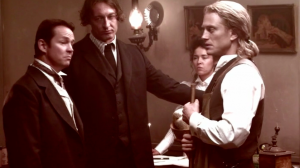
Filmmaking 101: If you have no confidence in your sets, your costumes, or your actors to sell the time period, make everything brown like an old timey photo.
One of the storytelling devices the Angel series used was showing flashbacks of the vampire characters from hundreds of years earlier when the characters were in their human lives or newly turned as vampires. Angel, Spike, Drusilla, Darla, and others all had their backstories fleshed out through flashbacks. I always felt these period-pieces were poorly done in Angel, and asking one-note actors like David Boreanaz to pretend to be old world characters with accents didn’t work either. I hated those flashback episodes and always fought to pay attention.
And so I had a flashback of my own while watching Angels and Demons: a flashback to watching Angel and hating that they were subjecting me to needless scenes from Angel’s early life. Of all the things from Angel to copy, that is one Blade‘s creators should not have emulated. Yet they did.
To be clear, I am not entirely anti-flashback. Just two episodes ago in Sacrifice we got wonderful flashbacks to Blade’s childhood, but those flashbacks were given in a way that both served character and story. By contrast, in Angels and Demons we get flashbacks to House of Chthon power player Marcus Van Sciver’s (Neil Jackson) human origins in the late 19th century, and what a mess these scenes are!
First, the performances are not convincing. I’ve always felt Jackson was perfectly cast as evil businessman vampire Marcus, but playing a happy-go-lucky newlywed opening a feed store in the 1800s was not in the actor’s range. (I really hope he honed his period-piece acting chops before filming 2013’s The Scarlet Pimpernel in which he is rumored to be the lead).
Second, the film style was annoying. Perhaps the budget was not there to convincingly create sets that look like old-time Detroit, but to put the scenes through an obvious video-toaster level sepia filter is obnoxious. It made the scenes ugly.
And third, while the flashbacks did tie into the modern day story, it was nowhere near as cleanly interspersed as Blade’s childhood was in Sacrifice. For much of the episode I didn’t realize they tied in at all. The framing for this week’s story was that Marcus’ newest protégée Krista Starr (Jill Wagner) was distraught over her role in the deaths of her mother and uncle last episode, and Krista works through her grief by getting drunk attacking humans.
Marcus is understanding but not exactly sympathetic as he tells Krista that all vampires suffer the deaths of the ones they used to love in their human lives. To illustrate this point, Krista has an after-death experience in which she sees Marcus in his human life.
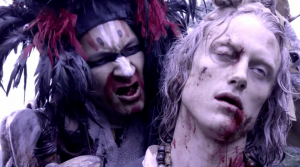
Had the series continued, would the Native American Vampire plot been further explored? I'd love to see Goyer try to explain that.
With that lame a set-up I was really not happy these flashback scenes at all. More, they confused me as we had seen Marcus being turned in the pilot as Krista’s first after-death experience, and I thought it took place in 14th or 15th century Africa with witch doctors and such. Seeing natives in tribal headresses and Marcus sporting an old-world hairstyle I thought it was far earlier than the 19th century, and not in the USA. Fortunately, the episode does address that dissonance.
However, the flashback got a bit more interesting as Marcus opens his store, and in walks Damek (Brent Stait) of the House of Armaya. We saw Damek previously, blackmailing House of Chthon pureblood elder Charlotte (Emily Hirst), but now we see him as an old-school gangster vampire running a protection racket in 19th century Detroit.
Marcus is willful and refuses to pay, so Damek forces Marcus to watch as he rapes and bites Marcus’ wife Isabelle in a scene that actually shocked me. I expected Isabelle to be beaten and disfigured, but the rape was graphic and extreme. And when Marcus still will not bow to Damek’s request, Damek boxes Marcus up in a coffin and ships him…somewhere. Here the episode doesn’t go into great detail, but I am taking it that the tribal people who turn Marcus are not African, but rather Native Americans who, with a black wolf, perform a ritual which turns Marcus into a vampire.
I can’t say I like the idea of American Indian vampire tribes, and I would have preferred something a bit more old-world, a bit more Anne Rice, which I had originally thought was Marcus’ background. I also do not understand why Damek would punish an enemy by sending him to be turned immortal. But I did like that Marcus has a long history with Damek, and an intense reason beyond the normal caste system for his hatred of pureblood vampires.
In the most trite of writing cliches, we see that in modern day Detroit the same Marcus/Damek dynamic is playing out again. While Damek got everything he wanted from Charlotte in his blackmail scheme, he has gone to Detroit to visit Marcus and demand a cut of Marcus’ financials. Why? Because he can is the best answer the episode gives us, and that isn’t enough for me. But it does shoddily create a parallel between Damek entering Marcus’ store in the 19th century demanding a cut, and Damek doing the same thing on a larger scale in modern day.
And, as in the 19th century, Marcus refuses to give in to Damek’s demands, and the two engage in a bloody brawl. I must say this fight has some truly great moments, such as Marcus holding Damek’s head in the burning fire, and Damek impaling Marcus with a fireplace poker. The sub-par CGI effects, such as Marcus pulling the poker out, don’t lessen the fight’s excitement.
I wish the episode had gone into more detail about why Marcus chose this moment to kill Damek. For nine episodes we’ve seen Marcus cow-tow to the purebloods while, in secret, working on the Aurora virus to kill them. But now that the virus is almost ready, Marcus kills Damek hand to hand? I would have liked to see the Aurora plot tie into Damek’s murder. How easy it would have been to, instead of having a brawl, have Marcus offer Aurora to Damek? As Marcus’ front for Aurora is that it makes vampires immune to silver, garlic, and sunlight, Marcus could have pretended to capitulate and offer Damek the opportunity to be the first unstoppable vampire. Then Damek’s greed causes a painful death fitting for his character.
Don’t get me wrong, the fight between Damek and Marcus was good, but it was random. The death by Aurora would have been a culmination of the plot so far. Instead, we just see Marcus, after over 100 years of being subservient to Damek, taking a stand and fighting back physically with no explanation as to why.
I do love Damek’s last moments. While Marcus has brooded for over a century about the way Isabelle was raped and killed, Damek just laughs saying “I don’t remember you, or whoever that whore was you say I killed”. A nice, evil touch that works to put centuries of evil deeds in perspective.
And with that strike against the House of Armaya, Marcus sends his right-hand vampire Chase (Jessica Gower) to dust Damek’s driver. And she does so in a very cool way–a swift roundhouse kick, her boot containing a James Bond-like blade, which cuts the vampire’s throat.
Then, in their shared pain, Krista and Marcus then have tender vampire sex. Well, tender may not be the right word, it’s actually really violent–full of fangs, blood, and biting, but the musical score tries to make the scene seem tender and emotional. I have to say I didn’t see this twist coming. The entire series thus far has been about Krista trying to get revenge on Marcus for murdering her brother. If we had a better actress than Wagner in the role of Krista perhaps this would have been foreshadowed and come across as believable; instead it just comes off as a shock and felt arbitrary.
And while Krista and Marcus do the bloody deed, Blade (Kirk “Sticky Fingaz” Jones) is watching from outside like some creepy peeping-Tom. Oh yeah, Blade! This series is called Blade, not Marcus! So where was Blade this episode? Well, he had a few scenes. Shen’s friend at the CDC diagnosed the Aurora as a virus designed specifically to kill only pureblood vampires, and there is some shaky scientific reason given as to why it’s developed in the wombs of human women (as revealed in Episode 6). So Blade goes to the House of Chthon to investigate, and Shen hacks the security system cameras…only to have his hacking undone by episode’s end.
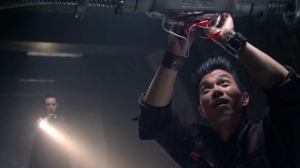
Given Whistler's fate in the films, I keep expecting Shen to have a lame death, such as being caught by a House of Chthon security guard.
Blade’s appearance in this episode felt obligatory and he really had no story to speak of, but there were some bright moments courtesy of Shen who I’m liking more and more as the series continues. Shen is alone in the sewer, hacking into the Chthon security system when he is interrupted by a security guard. Here, I really thought Shen might die. His snarky attitude was one of the bright points of the series, and I would have been upset to see him go. But surprise! Blade is lurking, and pulls the guard into the ceiling then drops his dead body. It was a fun bit of violence and I’m glad to see Shen live on.
Finally we get one scene of Charlotte, who becomes more convinced of Marcus’ betrayal when Charlotte’s spy Glynnis goes missing. This scene is there just so we don’t forget Charlotte, though I keep trying to.
And we get two scenes of Agent Collins. He is going back with his captain, when he sees a tattoo on the captain’s wrist–the captain is a Familiar. Collins escapes and goes running to…some woman’s house. This really confused the hell out of me so I had to stop the episode and do some digging–who was this woman? It turns out her name is Jessica Ellis, and way back in episode 3 she Was the coroner who showed Agent Collins the van full of ashed vampires. She was such a minor, functional character that I didn’t even include her in my episode summary, but now she’s back.
We had not seen her in 6 episodes, and for normal TV viewers this would have been a month and a half between appearances of this minor, generic character. I even went to TheWB.com where they have all these episodes on demand and include the “last time on Blade” scenes that are not on the DVD. In this episode’s recap there is no shot or mention of Ellis, so I imagine I was not the only one who was like “who is this?”
But the coroner has seen enough strange deaths, so she believes Collins’ story of vampires. She tells Collins of Blade, who was last seen in Detroit.
Overall, this episode was pretty mediocre. Still nowhere near the heights of Sacrifice, and with only three episodes left to go I am really hoping things escalate. A little less backstory and a little more story would be a welcome change of pace.
You can hear Arnie, Jakob, and Stuart review all the Blade films on the Now Playing Podcast podcast!
Read Arnie’s other Blade TV Series reviews:
| Introduction | |
| 1 | Pilot |
| 2 | Death Goes On |
| 3 | Descent |
| 4 | Bloodlines |
| 5 | The Evil Within |
| 6 | Delivery |
| 7 | Sacrifice |
| 8 | Turn of the Screw |
| 9 | Angels and Demons |
| 10 | Hunters |
| 11 | Monsters |
| 12 | Conclave |
| Conclusion | |
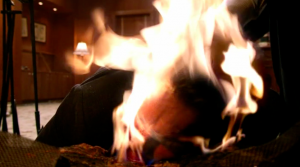
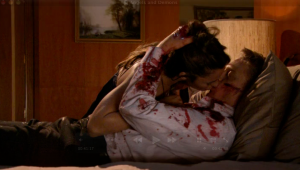
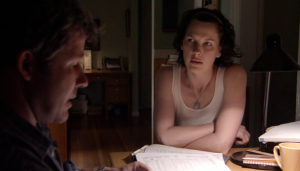
We will just have to 110% agree to disagree on “Angel,” but as for the remainder of “Blade: The Series” I have a feeling it will not prove much more satisfying to you, Arnie.